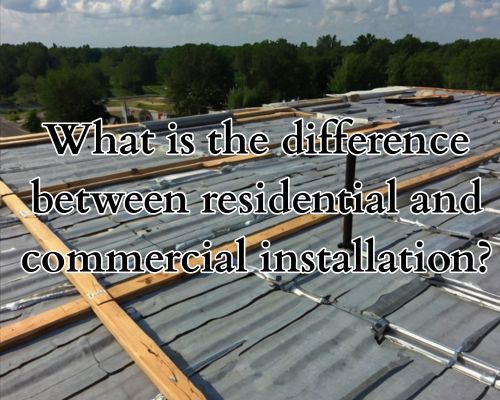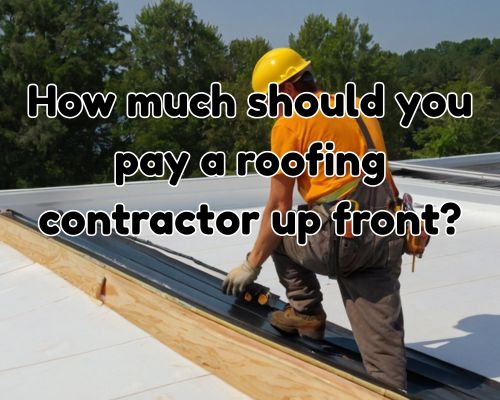
What Is the Difference Between Residential and Commercial Installation? A Comprehensive Guide for New Jersey Property Owners What Is the Difference Between Residential and Commercial Installation? A Comprehensive Guide for New Jersey Property Owners
If you’re a homeowner or business owner in New Jersey, understanding the difference between residential and commercial installation is key to making smart decisions for your property. Whether you’re upgrading your electrical system, HVAC, roofing, or security infrastructure, knowing these distinctions can save you money, ensure compliance with local codes, and guarantee safety.

What Is Installation? Setting the Foundation
Installation refers to the professional process of fitting or setting up equipment, systems, or structures in a building. Charles Jimerson of CJ Commercial Roofing NJ highlights that the scope can cover everything from electrical wiring and plumbing to HVAC units and roofing. The stakes differ dramatically between residential and commercial settings due to variations in building size, code requirements, and usage.
Core Differences Between Residential and Commercial Installation
1. Scale and Complexity
Residential installations typically involve smaller spaces — think single-family homes, townhouses, or apartment units. The systems installed are designed to meet the needs of occupants who use the space for living purposes. For example, a residential HVAC system in a New Jersey home will be sized to provide comfort for a few rooms or floors.
By contrast, commercial installations cover larger, more complex buildings such as office towers in Newark, retail stores in Princeton, or warehouses in Camden. The systems must support more extensive operations — multiple floors, heavy equipment, and high traffic volumes — requiring robust infrastructure and specialized installation techniques.
2. Building Codes and Regulations
New Jersey has distinct building codes and safety regulations for residential versus commercial properties. Residential installations must comply with the New Jersey Residential Code (NJRRC), which focuses on occupant safety and energy efficiency in homes.
Commercial installations, on the other hand, are governed by the New Jersey Commercial Building Code and additional standards such as OSHA requirements. These codes address fire safety, load capacities, emergency systems, and accessibility — all critical in buildings hosting large numbers of people or heavy machinery.
3. Materials and Equipment Specifications
Residential projects often use standardized, off-the-shelf materials suitable for home environments. For example, residential electrical wiring typically uses copper wiring rated for moderate load capacity.
Commercial installations require industrial-grade materials to withstand heavier loads, frequent use, and harsher conditions. For instance, commercial HVAC systems in New Jersey’s office buildings often involve chillers and cooling towers, while residential HVAC units focus on split systems or packaged units.
4. Installation Timeline and Costs
Because residential projects are smaller, they generally have shorter installation timelines and lower costs. A typical New Jersey homeowner might expect a residential electrical upgrade or roof replacement to take days to weeks, depending on the scope.
Commercial installations, with their complexity and regulatory hurdles, take longer — from weeks to months. They also require larger budgets, factoring in custom designs, specialized contractors, and inspections.
5. Contractor Expertise and Licensing
In New Jersey, the licensing and expertise required differ for residential and commercial contractors. Residential contractors focus on codes and safety for homes, while commercial contractors must be versed in complex systems, commercial codes, and larger project management.
Hiring a licensed commercial electrician in New Jersey is crucial for businesses to meet code and safety standards. Similarly, homeowners benefit from residential specialists who understand local ordinances and optimize for efficiency.
Why Location Matters: New Jersey-Specific Considerations
New Jersey’s climate, geography, and regulatory environment influence installation differences:
- Climate Adaptation: Residential and commercial HVAC systems in New Jersey must handle humid summers and cold winters, making energy efficiency paramount. Coastal areas near Atlantic City face salt corrosion challenges, especially for commercial installations.
- Local Codes: Municipalities like Jersey City and Hoboken may have additional codes or incentives, especially for green building certifications or energy-efficient installations. Commercial buildings pursuing LEED certification in Newark require specialized installation standards.
- Workforce Expertise: New Jersey boasts a strong network of licensed contractors skilled in both residential and commercial installations, ensuring property owners have access to quality professionals.
For more, visit https://cjcommercialroofingnj.com/.
Popular Installation Types in New Jersey: Residential vs Commercial
Electrical Installations
- Residential: Installing standard 100-200 amp electrical panels, wiring kitchens, bathrooms, and living areas with safety devices like GFCI outlets, according to NJ residential codes.
- Commercial: Wiring large buildings with 400+ amp service, integrating complex systems like fire alarms, security cameras, and emergency lighting per New Jersey commercial standards.
HVAC Installations
- Residential: Efficient split-system heat pumps or furnaces tailored to home size, emphasizing quiet operation and energy savings for families.
- Commercial: Large rooftop units, VRF systems, or chillers servicing multiple zones with centralized control systems for offices or retail spaces.
Roofing Installations
- Residential: Asphalt shingles, metal roofing, or tile roofs installed with attention to aesthetic appeal and durability in local weather.
- Commercial: Flat or low-slope roofing systems using materials like TPO, EPDM, or built-up roofing, designed to withstand heavy foot traffic and industrial wear.
How to Choose Between Residential and Commercial Installation Services in New Jersey
- Identify Your Property Type: Know whether your building is residential or commercial; this determines code requirements and system choices.
- Check Licensing and Experience: Verify contractor credentials specific to residential or commercial work in New Jersey.
- Understand Local Code Compliance: Ensure your project meets New Jersey municipal regulations — especially important in cities like Newark, Paterson, or Edison.
- Get Multiple Quotes: Compare pricing and project timelines for both residential and commercial bids to avoid surprises.
- Consider Energy Efficiency Incentives: New Jersey offers rebates for energy-efficient installations; eligibility can vary by property type.
Final Thoughts: Making Installation Decisions in New Jersey
Knowing the difference between residential and commercial installation is crucial for New Jersey property owners. It affects not only the cost and duration of the project but also safety, code compliance, and long-term performance. From the quiet suburbs of Cherry Hill to the bustling business hubs of Jersey City, making the right installation choice ensures your property remains safe, efficient, and future-proof.
FAQs on Residential vs Commercial Installation in New Jersey
Q: Can a residential contractor handle commercial installations?
A: Typically, no. Commercial projects require specialized knowledge, licensing, and adherence to stricter codes. It’s best to hire contractors with specific commercial experience.
Q: Are commercial installations more expensive in New Jersey?
A: Yes. They involve larger scale, specialized materials, and additional code compliance costs.
Q: How long does a typical residential installation take?
A: Depending on the project scope, anywhere from a few days to a few weeks.
Q: Does New Jersey have energy efficiency requirements for installations?
A: Yes. Both residential and commercial projects must meet NJ’s energy codes, with opportunities for rebates and incentives.
